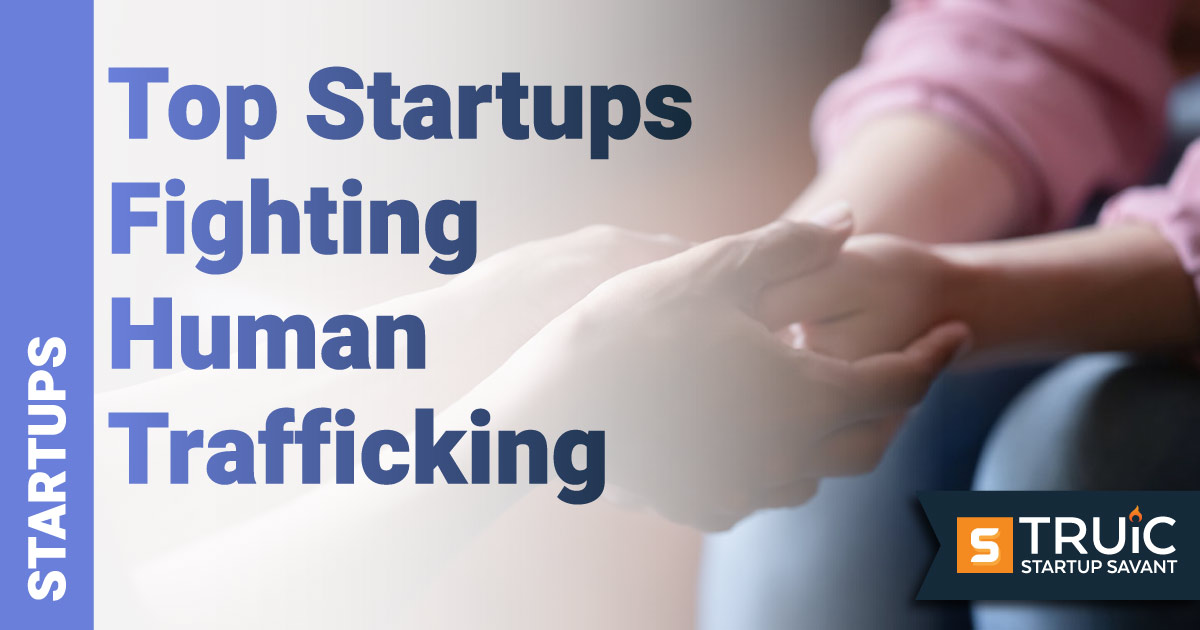9 Startups Fighting Human Trafficking

Last Updated: By TRUiC Team
Human trafficking continues to be a problem around the world, and the progress of technology only serves to exacerbate the issue. However, startups around the world are using the same tech in order to fight and reduce the crimes of human trafficking by identifying victims faster, training law enforcement, and improving antiquated systems.
Here are the top startups working to find solutions to help victims and fight human trafficking worldwide.
Learn how to launch your own company by reading our comprehensive guide, How to Start a Startup.
Companies Fighting Human Trafficking
1. Marinus Analytics
Location: Pittsburgh, Pennsylvania
Funding: $1.8 Million
Perhaps the biggest startup in the sector is Marinus Analytics. Marines Analytics is fighting human trafficking through their flagship product Traffic Jam. The tech helps law enforcement by using AI to recognize and find victims of human trafficking. They also have several other useful tools like Child Protection which gives social workers more time to focus on families rather than having to input data using an app.
2. Thorn
Location: San Francisco, California
Funding: N/A
Thorn is a technology-based startup that is partnering with local organizations, police, and companies to identify areas of need and develop technological tools that can help provide solutions. Their flagship product, Spotlight, has already helped over 17,000 kids get out of human trafficking. Using AI and other forms of technology, Thorn is able to identify victims faster and gives police the efficiency they need to catch predators before it’s too late.
3. Made for Freedom
Location: St. Louis, Missouri
Funding: $50,000
The problem with identifying and helping children of human trafficking is the process they must go through in order to reintegrate into normal life. To help with this issue, Made for Freedom gives victims an opportunity to create goods in exchange for employment and pay. The company helps victims get back on their feet in a time when processing trauma is hard to overcome.
4. AnnieCannons
Location: Oakland, California
Funding: $120,000
AnnieCannons is modernizing the ideas Made for Freedom uses to give victims of human trafficking an opportunity to work in the tech sector. The startup provides three main components of rehabilitation, including a boot camp, an incubator, and a mediator for long-term projects. Victims of human trafficking can learn technology and business as well as create their own projects, and AnnieCannons will help broker deals with major clients.
5. DeliverFund
Location: Dallas, Texas
Funding: N/A
There are perhaps no better-qualified founders to create DeliverFund than a team of former CIA, NSA, and Special Operations experts. The team has created one of the largest databases to help law enforcement identify victims in a matter of hours instead of weeks. DeliverFund then trains law enforcement to use the tech themselves and is available for advising.
Feeling inspired? Learn how to launch your company with our guide on How to Start a Startup.
6. Engine
Location: Cambridge, Massachusetts
Funding: $435 Million
Engine is a unique company on this list because they don’t focus on human trafficking alone but help broker better communication and policies between startups and the government. They are involved in many talks on human trafficking and help startups and non-profits talk with policymakers to get better systems in place to fight human trafficking. The company also deals with many other topics that need help with negotiations.
7. React Mobile
Location: Seattle, Washington
Funding: $10.4 Million
React Mobile is positioned as a panic button startup that works with hotels and other organizations to install the panic button system to create more safety. This plays into human trafficking by using the panic button to alert management that a possible human trafficking situation has been sighted. With supported training around identifying human trafficking victims, the panic button is a better solution to raise awareness and keep perpetrators from slipping through the cracks.
8. TraffickCam
Location: St. Louis, Missouri
Funding: $100,000
One of the main issues that law enforcement faces when trying to identify victims of human trafficking is sorting through overwhelming amounts of data points. TraffickCam is helping solve this problem by letting everyone become a contributor. The app lets people take pictures of hotel rooms to gather more data so AI can potentially find a quicker match. Most of the ads for human trafficking are set in hotel rooms, so the app will give law officers more chances of finding victims.
9. The Knoble
Location: Duluth, Georgia
Funding: N/A
The Knoble doesn’t just focus on human trafficking, but they look to help fight scams, elderly abuse, and child exploitation. They do this by first raising awareness of the issues through various methods, and they then equip organizations with the right training and eventually develop systems to implement. By working with several kinds of organizations and governments they are able to have a bigger impact.
Recommended: Check out our full list of the top startups to watch!
Frequently Asked Questions
What is human trafficking?
Human trafficking is a form of modern-day slavery. It is the illegal movement of people, typically for the purpose of exploitation. Traffickers use force, fraud, or coercion to control their victims. People may be trafficked for labor or sexual exploitation.
How bad is human trafficking?
There is an estimated 24.9 million victims of human trafficking at any given time anywhere in the world. Perpetrators prey on victims of any age, nationality, race, or sex.
What are the top states for human trafficking?
Right now in the US, California, Texas, and Florida have the highest human trafficking numbers.


